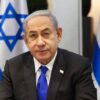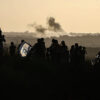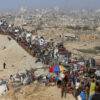Introduction
The Nakba, or “man-made catastrophe,” marks the 1948 expulsion of over 700,000 Palestinians from their homeland during the creation of Israel. Seventy-seven years later, this tragedy continues as a living reality, with ongoing displacement, violence, and systemic oppression of Palestinians. Despite mounting evidence of human rights violations and potential war crimes, the international community’s response remains largely passive. This article delves into the enduring nature of the Nakba, drawing insights from Dr. Anas Altikriti’s speech “From Occupation to Resistance: Understanding the Realities of Palestine,” and examines recent developments up to May 1, 2025.

1. The Nakba: A Continuing Catastrophe
The Nakba is not confined to history books; it’s an ongoing process of dispossession and denial of rights. Since 1948, Palestinians have faced systematic efforts to erase their presence, culture, and claims to their homeland. Dr. Anas Altikriti emphasizes that the Nakba’s legacy persists through continuous occupation, settlement expansion, and the denial of basic human rights.

2. Escalation Since October 7, 2023
The events following October 7, 2023, have intensified the humanitarian crisis in Gaza and the West Bank. According to Human Rights Watch, by late November 2024, more than 44,000 Palestinians had been killed, and over 104,000 wounded due to Israeli military actions. The destruction of homes, schools, hospitals, and infrastructure has reached unprecedented levels, exacerbating the suffering of civilians.
3. International Legal Actions and Challenges
In response to the escalating crisis, international legal bodies have taken steps to address potential war crimes and human rights violations:
- International Criminal Court (ICC): On November 21, 2024, the ICC issued arrest warrants for Israeli Prime Minister Benjamin Netanyahu and former Defense Minister Yoav Gallant for alleged war crimes in Gaza. Israel has contested the ICC’s jurisdiction and requested the withdrawal of these warrants.
- International Court of Justice (ICJ): South Africa filed a case against Israel at the ICJ, accusing it of genocide in Gaza. The court has scheduled proceedings to examine these allegations.
United Nations Special Rapporteur: Francesca Albanese warned of the serious risk of mass ethnic cleansing in the West Bank, highlighting Israel’s ongoing plans to annex Palestinian lands and displace residents.

4. Humanitarian Crisis in Gaza
The humanitarian situation in Gaza has deteriorated drastically:
- Water and Sanitation: Human Rights Watch reports that Israeli authorities have intentionally deprived Palestinians in Gaza of adequate water, destroying infrastructure and blocking aid, actions that may constitute acts of genocide.
- Forced Displacement: Nearly the entire population of Gaza, approximately 1.9 million people, has been forcibly displaced, with many unable to return due to the destruction of their homes and communities.
5. Global Complicity and Inaction
Despite clear evidence of human rights violations, the international community’s response has been largely inadequate:
- Arms Sales: Countries like the United States, United Kingdom and Germany continue to supply arms to Israel, despite calls from human rights organizations to halt these transactions in light of potential war crimes.
- Political Support: Many Western governments provide unwavering political support to Israel, often dismissing or downplaying reports of abuses against Palestinians.
Lack of Accountability: International legal mechanisms face challenges in enforcing accountability, as seen in Israel’s refusal to recognize the ICC’s jurisdiction and its efforts to undermine investigations.

6. The Role of Civil Society and Advocacy
Grassroots movements and civil society organizations play a crucial role in raising awareness and advocating for Palestinian rights:
- Student Activism: University students worldwide have organized protests, divestment campaigns, and hunger strikes to draw attention to the plight of Palestinians and pressure institutions to take action.
- Human Rights Organizations: Groups like Human Rights Watch and B’Tselem continue to document abuses and provide critical reports that inform international discourse.
7. Conclusion: The Urgency of Action
The Nakba’s continuation is a testament to the failure of the international community to uphold justice and human rights. As Dr. Anas Altikriti articulates, understanding the realities of Palestine requires acknowledging the systemic oppression and taking concrete steps to end it. Global actors must move beyond rhetoric and implement policies that hold perpetrators accountable, support Palestinian self-determination, and ensure the protection of human rights for all.
Call to Action
We, the people, hold the reins of truth and moral power. As the Nakba continues into its 77th year, let us rise above apathy and reclaim our collective humanity:
- Educate Yourself and Others: Learn the history and realities of Palestine beyond mainstream narratives. Share resources, books, and verified reports.
- Join or Support BDS: Support the Boycott, Divestment, and Sanctions movement as a non-violent means of pressuring Israel to comply with international law.
- Mobilize: Participate in protests, write to your elected officials, and demand your government stop supporting apartheid and war crimes.
Support Palestinian Voices: Follow and amplify Palestinian journalists, creators, and activists who are risking everything to share the truth.
Donate to Reputable Humanitarian Efforts: Contribute to organizations providing medical aid, food, and shelter to Palestinians in Gaza and the West Bank.
History is watching. The future will remember who stood in silence—and who chose to stand up.
Sources:
- B’Tselem: Database on fatalities and house demolitions
- Human Rights Watch: World Report 2025: Israel and Palestine
- United Nations Office of the High Commissioner for Human Rights: Special Rapporteur warns of mass ethnic cleansing in the West Bank
- International Criminal Court: State of Palestine
- International Court of Justice: Application for permission to intervene and declaration of intervention
- The Guardian: Israeli-American hostage Edan Alexander due to be released by Hamas
- Reuters: Israel asks ICC judges to withdraw Netanyahu arrest warrant
- Financial Times: Israeli curbs on Gaza water supplies are ‘acts of genocide’, rights agency says
El País: Israel comete crímenes de guerra en Gaza por el desplazamiento forzoso de palestinos, según HRW







